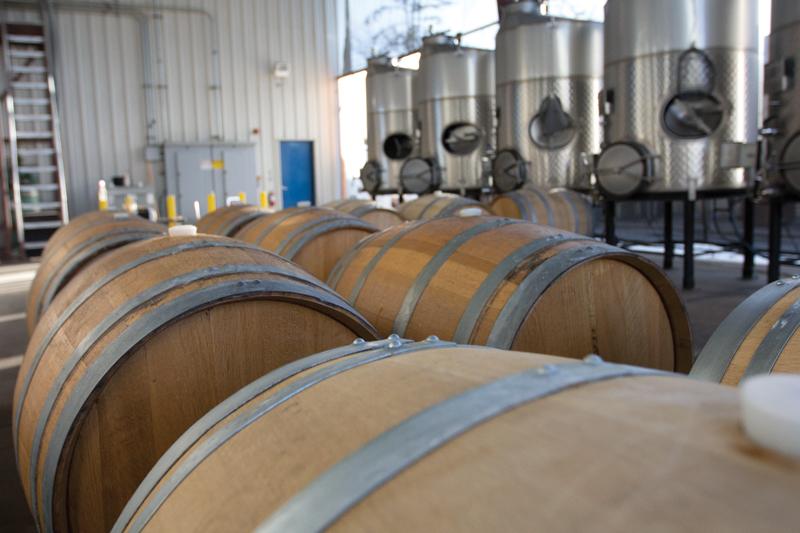Fresno State’s winery was the first university commercial winery in the country and continues to be the largest, producing up to 9,000 cases of wine every year, and provides students with a rare education and skillset.

Photos by Roe Borunda / The Collegian
The winery bottles 20 different wines and sells them to many retailers in the Valley, including Costco, Save Mart, Sam’s Club and Walgreens. The winery’s biggest client is the Rue and Gwen Gibson Farm Market at Fresno State. The revenue from the winery’s sales goes back to the departments of viticulture and enology.
Fresno State began producing wine in the 1950s for research and educational purposes, but in 1997, the university received a commercial bond to sell the wine it produced.
Joe Joralemon, the sales and marketing student assistant for the winery, said Fresno State is one of few universities that offer degrees and classes in enology (wine production) and viticulture (grape cultivation). John Giannini is the university’s winemaker who oversees the winemaking process.
The majors are in two separate departments that work together to produce grapes and wine. Students have lab components to their lectures that require hands-on work in their field. The viticulture department works in Fresno State’s 120 acres of vineyards that produce wine, table and raisin grapes. The enology department then goes through the steps to process the grapes into wine, which can take anywhere from six to 24 months.
Giannini said the winery produces many of the typical wines seen in wine shops. Most of the wines are red wines, and seven or eight are white wines. Each wine produced is made with a specific variety of grape. The exception is the most popular wine from the Fresno State winery: Tailgate Red, which is made with a variety of white and red grapes.
The processes for white and red wines differ, Giannini said.
For white wines, the grapes are pressed first. A yeast starter is made and added. The fermentation is monitored daily. White wines take around six months to mature.
For red wines, the grapes are crushed and pumped into a tank. The fermentation and yeast starter is the same as that of the white wine. While the grapes ferment, the tank is pumped daily to keep the grape skins wet. The wine goes through another fermentation process and then is pumped into oak barrels to age between nine to 24 months. Then the wine is filtered before it is bottled.
Joralemon said the winery is busiest in the fall during grape-harvesting season. In the spring, the winery focuses on blending, tasting and managing the wines.
Although all the wine grapes from the Fresno State vineyard are used at the winery, Joralemon said the winery makes more wine than the vineyard can produce. The winery buys the extra grapes from local vineyards. Duarte Trees and Vines of Hughson, Calif. is Fresno State’s biggest partner, he said.
By growing a wide variety of grapes and producing so many kinds of wine, Fresno State students in the enology and viticulture programs earn a broad education that prepares them for the real world, Joralemon said.
“The university gives students exposure to as many grapes as possible. We show them how to do everything. That way they can choose what they want to specialize in later,” Joralemon said.
Joralemon said very few schools offer this kind of coursework and Fresno State has the largest program.
“These are unique departments that not too many schools offer. Our graduates are highly trained and have a high hiring rate,” Joralemon said.
Joralemon said he believes it is the commercial license that sets Fresno State apart from other winemaking schools.
“We are able to train students in a more realistic way where what they’re learning in the lecture is applied in the lab. It’s a better overall learning experience.”






Tropique Wines • Mar 19, 2013 at 5:03 am
yeahh, the wine industry may appear to be one that is relatively simple. But in reality it is a complex industry with problems that are both unique and common. so the wine businnes is important but it turns out it has some interesting challenges.